I have a very simple MySQL update query on my InnoDB table.
UPDATE `players_teams` SET t_last_active=NOW() WHERE t_player_id=11225 AND t_team_id=6912 AND t_season_id=2002 LIMIT 1
My table is structured as so:
CREATE TABLE `players_teams` (
`id` int(11) unsigned NOT NULL AUTO_INCREMENT,
`t_player_id` int(11) DEFAULT NULL,
`t_team_id` int(11) DEFAULT NULL,
`t_league_id` int(11) DEFAULT NULL,
`t_season_id` int(11) DEFAULT NULL,
`t_div` varchar(64) DEFAULT NULL,
`t_player_number` varchar(3) DEFAULT NULL,
`t_player_jersey_size` enum('UNKNOWN','XS','S','M','L','XL','XXL','XXXL') DEFAULT 'UNKNOWN',
`t_player_registration_number` varchar(64) DEFAULT NULL,
`t_player_class` enum('ROSTER','SPARE','COACH','INJURED','HOLIDAY','SUSPENDED','SCOREKEEPER') DEFAULT 'ROSTER',
`t_access_level` enum('PLAYER','MANAGER','ASSISTANT') DEFAULT 'PLAYER',
`t_player_position` enum('ANY','FORWARD','DEFENCE','GOALIE','PITCHER','CATCHER','FIRST BASE','SECOND BASE','THIRD BASE','SHORTSTOP','LEFT FIELD','CENTER FIELD','RIGHT FIELD') DEFAULT 'ANY',
`t_spare_status` enum('INVITED','IN','OUT') DEFAULT NULL,
`t_drink_next` int(1) DEFAULT '0',
`t_no_fees` tinyint(1) DEFAULT '0',
`t_no_drink` tinyint(1) DEFAULT '0',
`t_auto_check_in` tinyint(1) DEFAULT '0',
`t_print_reminder` tinyint(1) DEFAULT '0',
`t_notes` text,
`t_last_chatter_id` int(11) DEFAULT NULL,
`t_last_history_id` int(11) DEFAULT NULL,
`t_last_active` timestamp NULL DEFAULT NULL,
`t_status` enum('ACTIVE','INACTIVE','ARCHIVED') DEFAULT 'ACTIVE',
`t_added` timestamp NULL DEFAULT CURRENT_TIMESTAMP,
PRIMARY KEY (`id`),
KEY `t_player_id` (`t_player_id`),
KEY `t_team_id` (`t_team_id`),
KEY `t_season_id` (`t_season_id`),
KEY `t_player_id_2` (`t_player_id`,`t_team_id`,`t_season_id`),
KEY `Team/Player ID` (`t_team_id`,`t_player_id`),
KEY `UpdatePlayersDiv` (`t_team_id`,`t_season_id`)
) ENGINE=InnoDB AUTO_INCREMENT=23454 DEFAULT CHARSET=latin1;
This simple update query takes on average, 3.5 seconds? I'm running this on a MediaTemple MySQL GRID container.
Here is the result of an EXPLAIN when switching the UPDATE to a SELECT.

Can someone provide some insight on how I'm not doing this correctly?
[EDIT: Added list of Indexes]
So is this a big mess of indexes? Do I have a bunch of redundant indexes in here?

Cheers, Jon